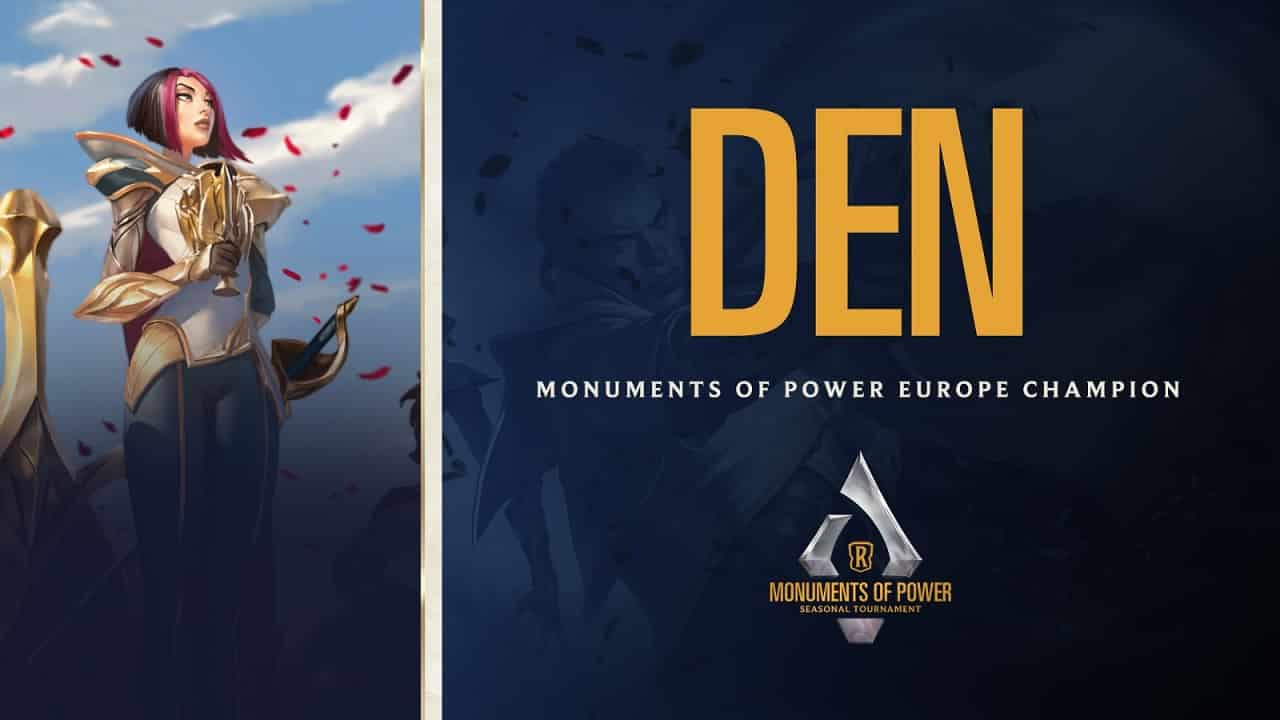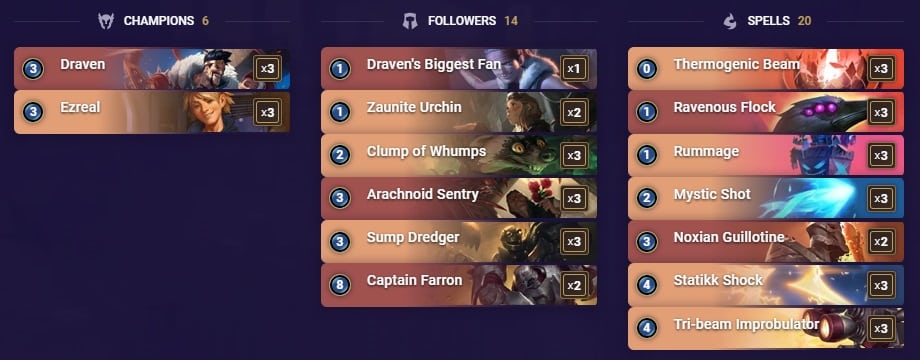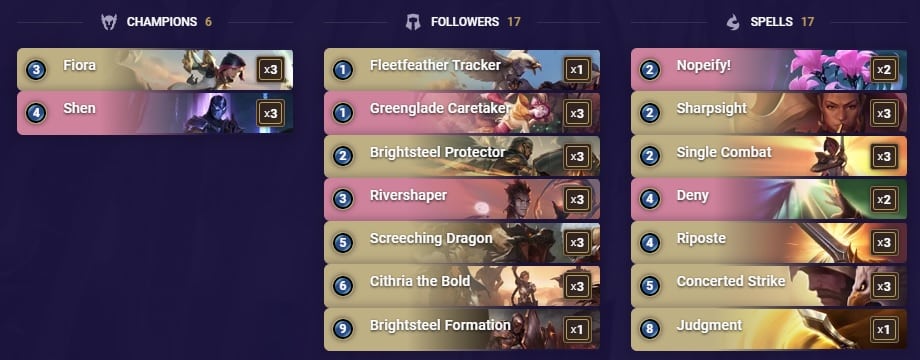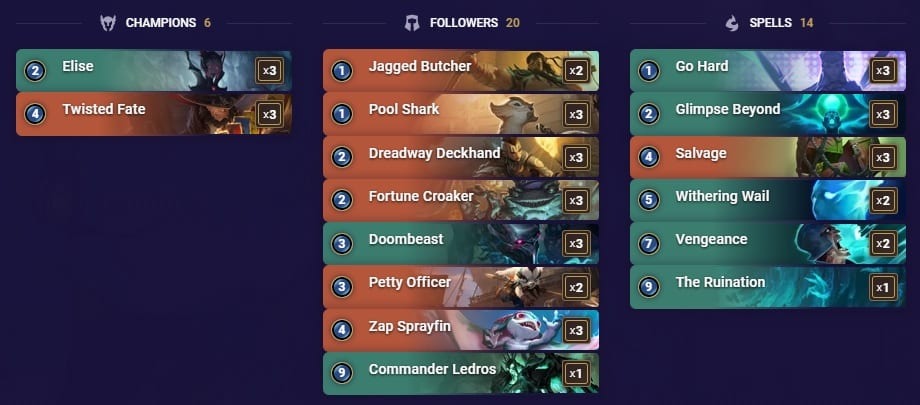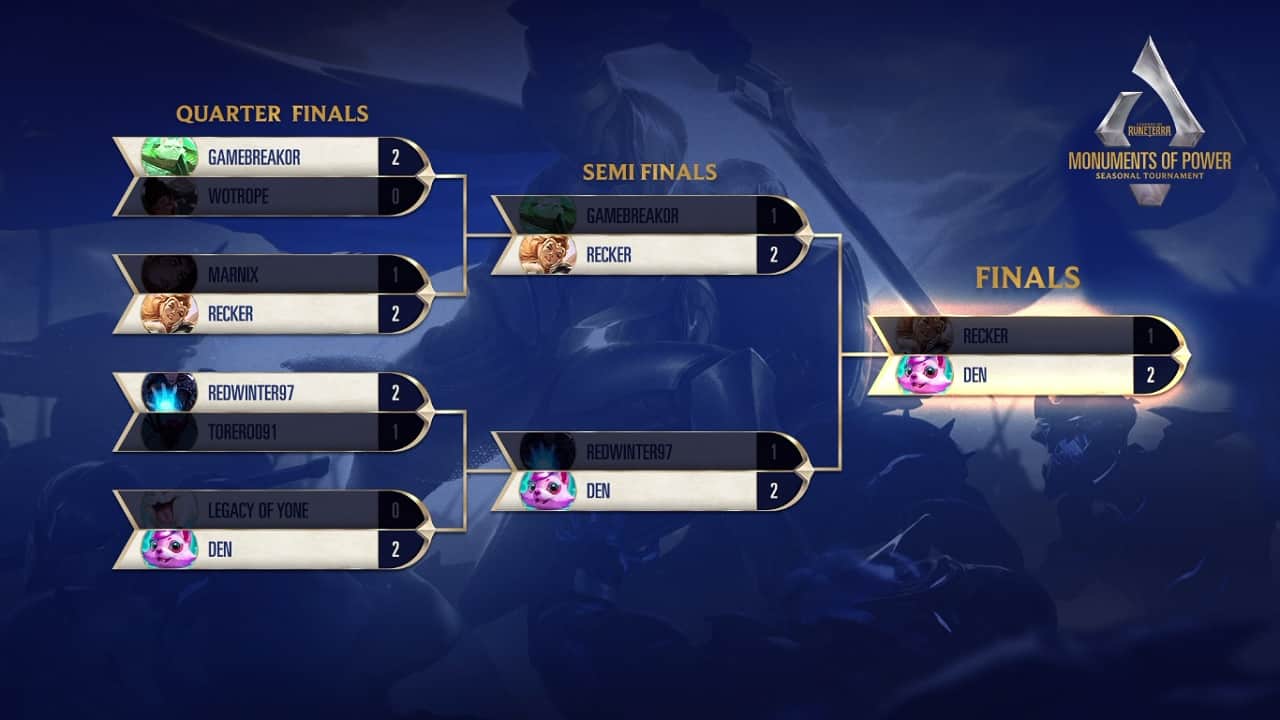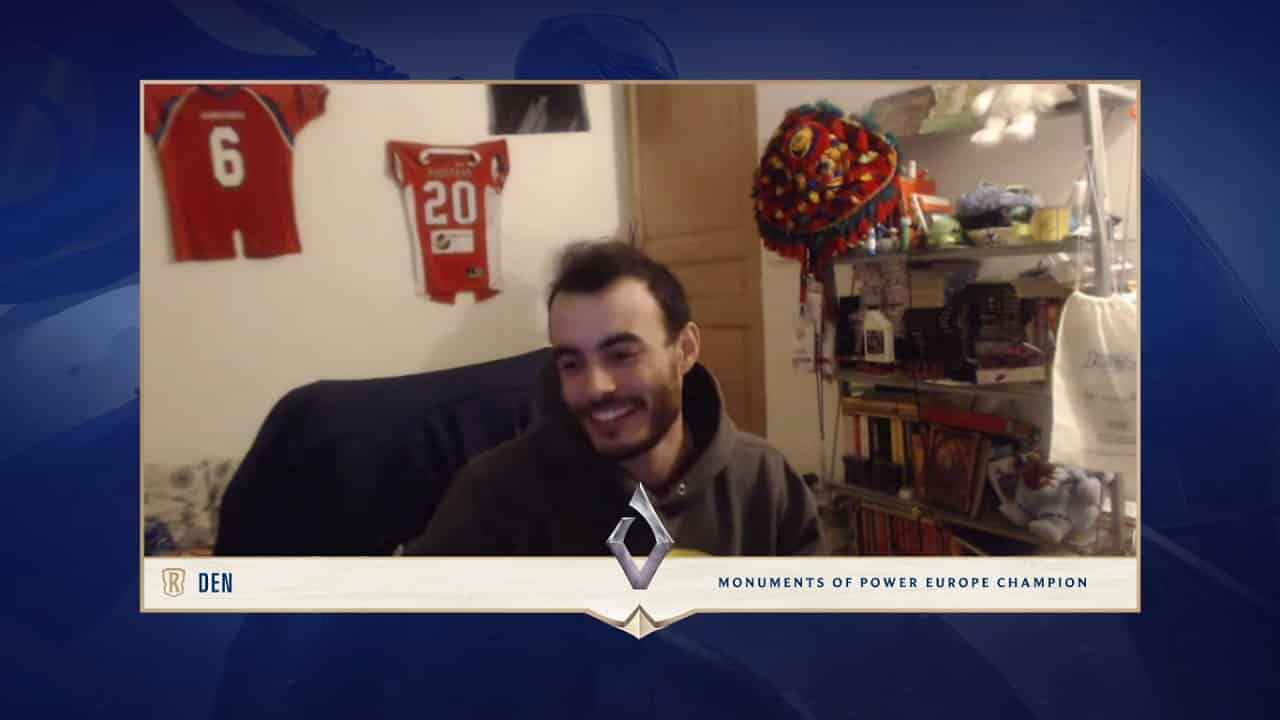Hey everyone,
I’m “Den,” the winner of the Legends of Runeterra Seasonal tournament for EU. My background in CCGs is Hearthstone, where I’ve been a coach at various levels of the game for the past 7 years. Since this was LoR’s first Seasonal tournament, TLG thought it would be interesting for me to share my experience with the community.
Before we get started, I want to thank Riot Games for the smoothest tournament run I’ve ever experienced. The in-game client was perfect and I never had to ask an admin for anything or wonder when I would play next. My life as a player was very easy on both of the days I had to play.
I also want to thank everyone who played a role in me making it to the tournament. So, every player I talked to in private or during our snapshot meetings at TLG, L’associsson, Trec, Wolwi, Clémy, Kalas, Flechenoire, Othal... thank you!
If you’re interested in being coached by Den, you can contact him on Twitter: Follow @den_CCG
Writing: Den
Editing: Wusubi, Sebodunum
Table of Contents
Short personal background
Being a coach for so long now, I usually never take tournaments too seriously. I was focused on helping others with their preparation and stopped wondering if I could perform or not years ago. I’ve focused on writing good articles, casting and mostly coaching for at least the past 4 years without ever regretting not trying to be competitive once. It has become a common joke in my friend group that whenever I lose in a tourney, I say “It’s fine, I’m a coach, it was a good experience.”
Before card games, I played American Football and it has been a passion of mine for many years. I was super competitive during that time and had the chance of winning a European title back in 2014 while playing in Helsinki. I took a lot of that mindset into my coaching approach and as a result, it’s often hit or miss with my students. We either get along perfectly and they respond to my disciplined approach to the game, focusing a lot on fundamentals and game mechanics, or they don’t and the relationship stops pretty fast.
I was a nobody in the LoR scene when entering this season. I played in Beta last year, but stopped playing from February to September and only came back to it because Othal, a former Hearthstone student, asked me if I could help him go pro. See the irony already? Helping Othal made me treat LoR seriously. When it comes to my students, I do what’s needed for them to perform. I started playing, analyzing the meta, following the scene and actually remembered why I enjoyed it the first time the year before.
Two of my closest friends, Wolwi and Trec, were playing the game casually and helped me get back into it. The fact that these two were also trying to qualify for Seasonal played a huge part in me tryharding for this. Then, Othal showed me a Tweet from Team Leviathan Gaming looking for writers and told me that since I was doing the same in HS, I should apply. Indeed, it felt like a perfect match. Team Leviathan Gaming is a mix of pro players, content creators and passionate people. As a result, I felt I found a home in Runeterra.
I had the perfect mix - a dedicated student I wanted to be the best for, close friends sharing that interest with me and a team of people with an approach very close to mine. The stage was set for success.
Relearning the game
Coming from Hearthstone, Runeterra isn’t such an easy game to master. The action-based turns and the mana storage mechanics are very different from the very tempo turn-based game that Hearthstone is. Reaching Masters with tempo decks felt fairly easy; I immediately felt good playing stuff like Scouts, Frostbite or Mistwraiths and could pilot them to a decent level. The real learning part was when I started facing more experienced players who would put me in situations where Runeterra knowledge was necessary and not just general card games concepts.
This is where the snapshot meetings with TLG came in clutch. Being exposed to all these players’ opinions as well as being the one responsible for putting them down and explaining them to a wider audience skyrocketed my level of play. I never doubted I could qualify for Seasonal. Top 700 on ladder felt easy to reach, but I also knew that the guys I was conversing with in these meetings were way above my current level of play.
Coaching Othal and writing articles were the best ways for me to prepare, at least at first. I believe explaining and being able to structure your thoughts are the best ways to be in control in card games. Once you’re able to build a game plan and find reasons to your actions, it becomes much easier to get better, as you just compare what happens in practice to what you had in mind and try to understand the differences.
I played a ton of LoR during the first two weeks of November and tried to reach 300LP so I could just sit and know I would qualify even if I didn’t play anymore. The switch from a theoretical approach which consisted of coaching and writing to long practical ladder hours really helped. From writing the meta reports, I had a lot of information from very good players and it was time to battle test them. I feel this is the time where I improved the most, learned new archetypes and started tailoring my approach to playing LoR as a unique game and not simply using my generic CCG knowledge.
The Go Hard meta started to shape up at the end of November and the only thing I was sure of was that I wanted to bring Mistwraiths, which was my ladder deck and good against Go Hard. Fiora-Shen was also my comfort deck, so I planned on bringing it as well. Finally, Ezreal-Draven was a deck I picked up after various talks and watching Alanzq stream it for days. I had three decks and something of a strategy. I could finally start working on my line up.
An open field for a specific line up
My vision of the tournament was that it would be very wide; being made up of 1024 players made it impossible to bring a targeted line up. At best, I thought I should bring a soft targeted line up (against Go Hard) and just work on my decks to play well in as many matchups as possible. Mistwraiths – Ezreal-Draven – Fiora-Shen looked like a solid line up and I was convinced that all three decks were decent against Go Hard (I was wrong).
The Fiora-Shen list was easy to build. Most techs and flex cards were oriented towards Go Hard, so triple Cithria the Bold and Nopeify! took these spots, while the Greenglade Caretaker replaced Fleetfeather Tracker. This was because the latter has one health and is thus very weak to Go Hard.
I found my list for Ezreal-Draven quickly as well. I had lots of discussions about whether to include Tri-beam Improbulator or not, and I found that lists with Tri-beam needed to cycle a lot to find the card often and have time to build it up. My list wasn’t much different from the standard ones, I simply replaced House Spider with Clump of Whumps and that allowed me to cut Chump Whump for more draw and consistency (2x Zaunite Urchin and 1x Draven’s Biggest Fan).
I was really confident about Mistwraiths, as it was my main ladder deck. It was also one of the best decks against Go Hard up until a few days before the event. I don’t know if it was Gamebreak0r or someone else, but it was his list that I saw first, and it totally changed my approach for the tournament with regard to my Mistwraiths deck. The list had Petty Officer and Withering Wail, two very good cards against Mistwraiths.
I tried a list with Unspeakable Horror so I could break the kegs when needed, but the matchup was different and I didn’t feel good banking on this, as the rest of the field wasn’t so favoured for Mistwraiths. I got to a stage where I felt okay with the list, but the closer I got to the tourney, the more I was getting a feeling that the deck I was previously most confident and comfortable with was now the one that could end up being an issue.
The morning of the tourney, people on various Discord servers were talking about their line up and I still had some doubts about my Mistwraiths deck. To help me clarify my thoughts, I read through the different line ups from players I respected, and I saw Frostbite in several of them. This deck was something I knew how to play, Reckoning was great against Go Hard while making my line up pretty good against Fiora-Shen, another deck I anticipated seeing a lot of. So even though I don’t like changing at the last minute, I have to admit I do it a lot, and this time it worked out perfectly.
Playing for Top 32
I didn’t really know what to expect getting in the tournament, I knew I had a correct seeding (being in the Top 200 ladder players) and shouldn’t face well-known players in the first few rounds at least. My idea going into the event was that the game strongly rewards the player in control of tempo, i.e. the player who is in charge of deciding when they can pass or when they can take calculated risks. My line up of tempo decks with reactive spells was ideal for that gameplay and I was feeling good on the decks, even though the overall strategy might have had some flaws.
My preparation outside of the day itself was what I do for most of my tournaments. I usually play a lot 2 or 3 days before the tournament and then have a complete day off right before the event and just do something else, preferably outdoors. In my opinion, playing until the last minute doesn’t help. All it does is increase fatigue and stress while not making you a better player. Having a day off lets your brain process all the information you gathered during your 2 or 3 days of playing, allowing you to actually think back on things that you were too tired or distracted to notice back then.
I went 10-1 that day and almost everything went according to plan. I faced Go Hard or Fiora-Shen in 3 out of my 5 rounds and won 2-0 against those decks. My other 2 rounds were against a line up I was scared of (Feel The Rush, Ezreal-Draven and a third deck). However, once I banned Ezreal-Draven, my opponent’s line up became far more vulnerable.
To summarize my thoughts at this stage, my main ban target was fine (Ezreal-Draven) but not optimal, Go Hard wasn’t a good match up for my lineup if my Fiora-Shen was banned, and I wasn’t so sure about my ban target when Ezreal-Draven wasn’t in my opponent’s line up.
In all honesty, I didn’t put that much work into this part of the tournament, my goal was basically to get the cardback and go back to coaching and writing articles! I was happy playing the game, but when I looked around me, I saw people who were better than me, and helping them if they ended up qualifying was a satisfying enough thought for me. It turned out that I ended up being the only one from my group of friends and teammates to qualify for Top 32. Now, something in me clicked and I felt like I was going to give all I could to win the tourney.
The tryhard week
The week between qualifiers and Top 32 was dedicated solely to LoR. I had coaching sessions planned and still did some exercise to relax, but I had a single focus: finding that third deck that would make my line up perfect. I had great trust in Ezreal-Draven and Fiora-Shen, so much so that I only played 10 games with each during the whole week. Looking back at my games in Top 32, I probably should’ve played Ezreal-Draven more.
Frostbite was a deck I felt good with, but the classic lists were tragic against Go Hard, as all the 2 drops only have 1 health. After some practice I found other cards to put in the deck. Starlit Seer and Ruthless Raider felt great as a starting point for the curve. I played the deck a ton on ladder and never really reached high rankings, but I was fine with this because I felt like the deck was really targeted towards tournament play, so its ladder performance was largely immaterial.
Once I thought I had that super third deck, I asked around for players to face me so I could try out my strategy, and the real turning point was on Friday (two days before the tournament) when I asked Ultraman to play Go Hard against me.
Ultraman was #1 on EU ladder playing Go Hard at the time, so I figured if my decks were decent vs him, I was good to go. He destroyed me in those games and only Fiora-Shen ended up with a positive winrate. I felt like I was missing something and I had it all wrong. We talked and he explained why it was favoured against Ezreal-Draven and Frostbite.
After that session, I felt that actually, there might not be 3 decks with favourable matchups against Go Hard that could fit my vision of the game. I didn’t want to go for a line up with Feel The Rush, Mistwraiths and Lee Sin for example. I went for what made the most sense in the end, which was playing Go Hard and changing my ban strategy.
I was now banning FTR first and then being flexible depending on the line up. I could ban Go Hard if I felt like there wasn’t anything worth banning, or I could leave it and play the mirror match where I felt good, a Fiora-Shen which I trusted a lot and Ezreal-Draven, where I would just play high tempo and hope to get a good Captain Farron on Turn 8.
I was exhausted on Friday, I probably had more than 40 hours of Runeterra on the week at this point, and at least 30 hours went on building a deck that I just decided not to bring. I had coaching sessions until 1 AM that day and didn’t really have time to put as much work as I wanted to into that new strategy. I decided that sleep was more important though and that I would play 10 games on Saturday instead of my full day off. I would have played much more if I listened to myself, but the rest was much needed and I think I would have been under much more stress on Sunday if I decided to keep playing and not have any relaxing time.
I woke up Sunday morning feeling good, but not as ready as I wanted to be. The changes on Friday were definitely decent, but I was still processing information that I should’ve mastered by that point in order to play optimally during the tourney. I decided to play for an hour from 11 AM to noon before submitting the decks, as a way for me to warm up my brain and to calm myself down, because I still felt like I was missing something when playing Go Hard.
For the first time since I started playing LoR, I was feeling the pressure and my laid-back attitude of “It’s fine, I’m a coach, not a competitor” had vanished as a mental crutch.
The big day
My first round started and I wasn’t facing the player I had expected - I must have read the seeding wrong or my original opponent had dropped out. I knew the guy’s name (Lord Simplet) from the French community and knew he was good. He was playing Anivia, a deck that I loved playing when I came back to the game and that I even considered bringing to the Top 32, thinking it was good against Go Hard (silly me). Then he had Go Hard and a third deck that I banned.
I felt really good playing against decks that would let me set-up in the early game and put me in charge of tempo, which was exactly what my decks were aiming at doing. I ended up winning 2-1, my Ezreal-Draven couldn’t find Captain Farron against Anivia, but did against Go Hard and won me that game. This put me in a really good mindset for the tournament, as I felt confident in my play. Even though the match felt close, I was in control of my decisions, knew what to look for in my opponent’s list and controlled the timer like I wanted to.
My second and third rounds went super smoothly. I won in less than 20 minutes each time with a 2-0 score, which allowed me to start watching my next opponents on stream and take a break from one round to another. This put me in a perfect condition for my streamed semi-final against Redwinter later on. One thing I was very confident with for the tournament was my gameplay with Fiora-Shen. Aggressive decks were not popular in the tournament and the deck felt great against Midrange and defensive strategies.
When watching Redwinter play on stream with his Fiora-Shen, I saw tons of things that I felt I could use when facing him. Also, his match lasted for almost the whole hour, and he was showing visible signs of stress on camera. All that made me super confident when facing him.
Despite having lost what was one of my best matchups in Fiora-Shen vs Go Hard to open the series, I never felt pressured. Fiora-Shen wasn’t my go-to deck for most of my preparation time, but it was a deck that I felt good playing with on ladder when the meta allowed for it. In the feedback I got from the tourney, I got a lot of praise for my play with the deck. I think this is simply a result of the deck fitting my natural playstyle perfectly.
Coming from Hearthstone, I really wanted to build the perfect line up and predict the meta. In established games, there are a lot of players in the tournament scene who all have a good enough level to be able to contest any opponent. As such, precise construction and modification of line ups is very important in gaining an edge in a tournament. Having said that, something I realized looking back on the tourney is that comfort and matchup information were much more important than finding the perfect line up.
All the talks with Team Leviathan Gaming’s top level players in our snapshot meetings were really clutch in that regard. This probably played a bigger role in the last 2 games than the thousands of games I might have played while prepping.
So, even though I thought Top 32 would need more predicting skills to build the right line up (and Gamebreak0r’s lineup showed that) and that comfort would be less important than it was for the qualifying round, in the end, it was my comfort levels that won me the last two matches of the championship. Although I felt like the line ups in the final were even, I was probably unfavoured because Recker had Feel The Rush, so he could predict my ban and be flexible on his.
If draws and line up building had been the deciding factors for the 8 first games, I feel like I won the last 2 because I was better at that specific playstyle and knew exactly how to play against Fiora-Shen. This had been helped further thanks to having the chance to watch my opponents play Fiora-Shen on stream and being able to identify their specific tendencies.
Top 32 was the day I felt the best in my gameplay if I compared it with any other day during my preparation. I believe I still have a lot to learn about LoR - just like every other player in the current state of the game. Yet, having a solid background in Hearthstone and coaching others for a living definitely made a huge difference for me during the finals.
Doing the simple things right was what mattered the most for this event. A rest day before the competition, exchanging points of view with other players I trust and staying focused throughout the whole day were key factors when it came to the last games. I lost both opening games in my semi-finals and the finals - in a best of 3 format, that’s usually a very bad thing to do. But this is where preparation and the flawless organization from Riot came in.
I don’t remember being worried or tilted at any point, even at 0-1 in the finals and even when I was convinced that I would lose 0-2 as the game progressed in my Ezreal-Draven match against Fiora-Shen. I threw down my Ezreal fully aware that if he died, the game was over and I would be the runner-up. Thankfully for me the story went differently, and my opponent misplayed, allowing me to take control of the mirror match.
Overall, what I will take from this whole experience is that I played my vision of the game during these 2 weeks, prepared my way and played decks I felt good with and able to accept mirror matches most of the time. I probably missed things during my preparation or my matches and could have brought better lists.
We all knew that BO3 would require a bit of luck to go 10-0, but the important part is not where you got lucky, as all of us get lucky in card games eventually. My take on the game carried me when luck didn’t, and for that, I can say that I won, and I’m the first ever European seasonal champion and will take great pride from that.
The game is still very young and has lots of years in front of it, hopefully great ones if Riot keeps on improving like they did over 2020. I was a surprise to myself, let alone everybody else, in that tournament and I’m sure that the next Seasonals will have many surprises too. Thanks to anyone who read this long look back at my tournament experience, I had a great time writing it and thinking about my experience. If more opportunities come my way in the future because of that win, I’ll be more than happy to share it with anyone who wants to read.
Have fun and see you in a couple of months, where I’ll be prepared to defend my title.

